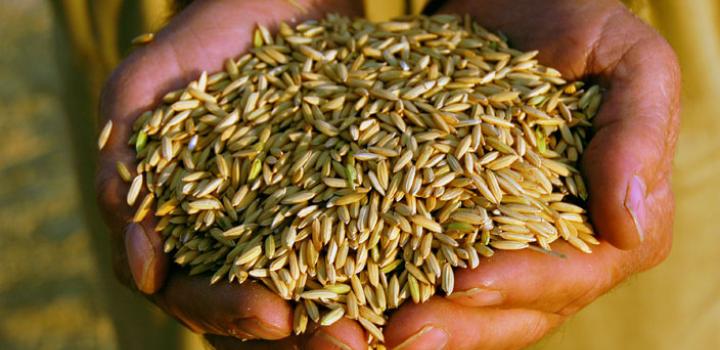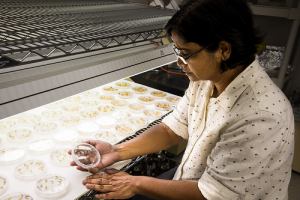Arkansas scientist recognized for innovative research into rice gene mutations
by September 12, 2018 6:23 pm 798 views

Removing part of a rice plant’s genetics may be the best way to help the plant survive disease, insects and a rapidly changing environment. University of Arkansas professor Dr. Vibha Srivastava has been working on “gene editing” to help rice breeders develop new forms of rice.
The potential of her work was recently recognized by Springer Nature, a global research and education publisher that specializes in the promotion of cutting edge scientific advancements. The publisher chose Srivastava’s research paper on her attempts to delete chromosome sections, to feature in their online “Change the World — One article at a time” section.
Springer Nature selects research articles from its research journals in various scientific disciplines. The papers are nominated by a publications’ editors’-in-chief and submitted to the publishers, according to the university.
“A plant’s genetic traits are developed through mutations that occur naturally in response to environmental stresses,” Srivastava said.
Those conditions include plant diseases that mutate to overcome resistance and insects that eventually adapt to defeat a plant’s natural defenses, she said. Environmental changes can include climate changes that affect air temperature or water availability, or the invasion of new weeds or insects.
Conventional breeding requires scientists to cross many generations of plants in order to move useful mutations that occur in nature from wild cousins of rice into breeding lines that may lead to new cultivated rice varieties, she said. The process can take decades.
Srivastava is adapting a technology called “CRISPR/Cas9.” CRISPR is scientific shorthand for “clustered regularly interspaced short palindromic repeats.” These are segments of DNA that contain short, repetitive base sequences, she said. Cas9 stands for CRISPR associated protein 9, a type of protein that can be guided by CRISPR to induce cuts or double-stranded breaks in DNA. Srivastava said the cut is repaired by the cell through an error-prone process that uses mutations.
“There are two techniques for gene editing,” Srivastava said. “Point mutations attempt to induce a mutation in a single gene and defined deletions attempt to excise a larger chromosome section.”

Srivastava was attempting to delete a chromosome section by inducing cuts at two different points that mark the beginning and end of the section she wanted to remove.
During her research, she found that removing genes is difficult, she said. Removing genetic code might seem an unlikely goal, but Srivastava said it has the potential to eliminate a yield or quality limiting plant characteristic. One such gene segment, she said, controls rice grain quality. When it is activated, by high nighttime temperatures, it causes a decline in quality. Deleting that set of genetic instructions could help improve rice grain quality in the face of a common climate problem for Arkansas rice growers.
Srivastava had hoped that mutating the two points that defined the target gene section would result in the section being deleted. But, what she discovered was that it simply mutated those two points and left the intervening section intact. Research may not always take you where you expect, Srivastava said, but it advances knowledge that can help design a new experiment or even lead to unexpected discovery.
With accidental discovery in mind, Srivastava and research technician Shan Zhao are growing the gene edited plants in a greenhouse to maturity so they can evaluate whether any advantageous traits have been induced. No gene edited plants leave the greenhouse or her lab, Srivastava said. Gene editing is still experimental and is not used in the University of Arkansas Division of Agriculture plant breeding programs, according to the school.
Srivastava learned that colleagues in other research institutions were conducting similar experiments and encountering the same difficulties.
“But no one was reporting it,” she said.
Some scientists may be reluctant to report when their experiments don’t succeed in accomplishing their intended goals. Srivastava said she believes the knowledge gained is valuable, even if only to point ongoing research in new directions.
